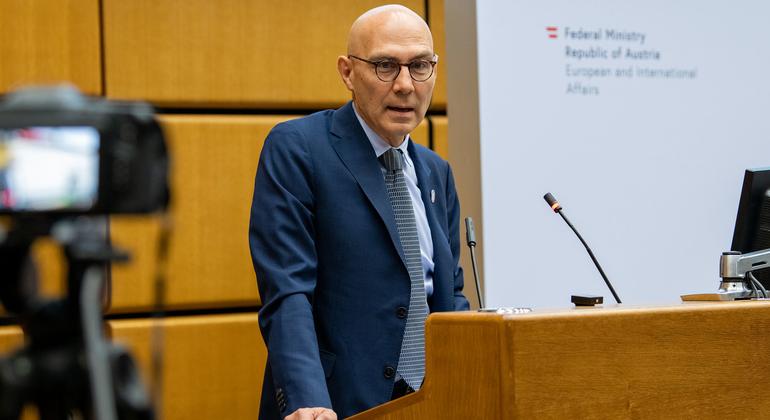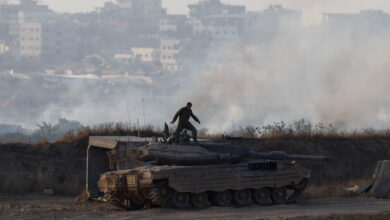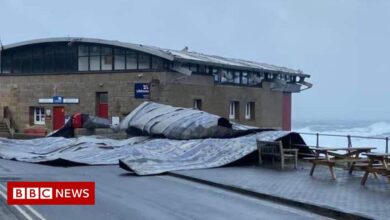UN human rights chief ‘shocked and appalled’ by Israeli minister’s comments about Gaza starving

OHCHR UN High Commissioner for Human Rights Volker Türk was “shocked and appalled” by comments by Israeli Finance Minister Bezalel Smotrich, who suggested that it might be “justifiable and moral” to let two million Palestinians in Gaza starve to death in order to free hostages, spokesman Jeremy Laurence said.
The High Commissioner condemned these words in the strongest terms, saying they incite hatred against innocent civilians.
Risk of Incitement
Mr. Laurence explained that the killing of civilians as a method of warfare and the collective punishment of the Palestinian people are both war crimes.
“This direct and public statement risks inciting further atrocities,” he said.Such statements, especially by public officials, must cease immediately.They must be investigated and if found guilty, prosecuted and punished.”
Mr. Laurence also reiterated OHCHR’s longstanding call for an immediate ceasefire in Gaza, the release of all hostages and increased humanitarian access to the enclave.
“This is an immediate call to the Israeli authorities that they have a responsibility to monitor this behavior,” he said. “Moreover, let’s take it one step at a time. That is the first step. That is the responsibility of the Israeli people.”
‘Exodus’ from Khan Younis
Meanwhile, the impact of the latest evacuation order in Gaza has been “very clear”, a senior communications official at the UN agency assisting Palestinian refugees, UNRWAsaid on Friday.
Louise Wateridge spoke to United Nations News a day after the Israeli army issued a directive, forcing thousands to flee from eastern and central Khan Younis and the Al Salqa area of Deir Al-Balah.
Ms Wateridge was in Khan Younis on Thursday afternoon and saw hundreds of families moving west in temperatures exceeding 30 degrees Celsius (86 degrees Fahrenheit).
“It was a horrific scene,” she said. “It was like an exodus of these people all over again. They took whatever they could with them. They didn’t seem to have many belongings. We saw fewer family cars and mostly people on foot.”
Polio vaccination campaign
Ms Wateridge also mentioned plans to vaccinate more than half a million children in Gaza against polio after the disease was detected in wastewater samples last month.
UNRWA together with the United Nations Children’s Fund (UNICEF) and the Gaza Ministry of Health will launch two vaccination campaigns in the coming days.
“Of course, this operation would be much easier to carry out and much faster if there was a ceasefire,” she said.
“We have been calling for a ceasefire for months. It would be hugely beneficial for any humanitarian response in the Gaza Strip, including the polio vaccination response.”
She stressed UNRWA’s deep commitment to leading vaccination campaigns on the ground, highlighting the agency’s role as the largest organization in the Gaza Strip.

A girl receives food from an outdoor kitchen supported by the World Food Programme (WFP) (file).
No safe space for children
Separately, UNICEF continued to highlight the dire situation for children in Gaza, whose “only hope of survival is a ceasefire,” communications officer Salim Oweis told journalists in Geneva on Friday.
“The life of a child in Gaza, in the 10th month of this conflict, is not life.. We can’t say enough – there is nowhere safe, and everything is running out – food, water, fuel, medicine. Everything,” he said. speakSpeaking from Amman, Jordan.
Mr Oweis recently visited Gaza, where he was “shocked by the level of suffering, devastation and mass displacement”.
Overloaded sanitation system
He told of walking through “a maze of makeshift shelters” where “you struggled to climb up onto the sand where they lay and smelled the stench of sewage that permeated the surrounding passageways”.
Water and waste are a major problem, he said, referring to the situation in Deir Al-Balah, where most of the displaced have fled in recent months.
The partially functioning sanitation system there is estimated to be seven times overloaded at capacity, meaning the decades-old sewage network is mostly clogged and leaking.
Lack of medicine
“Families have been asking me urgently for soap and toiletries. They are using water and salt to clean their children or boiling water with lemon to try to treat skin rashes,” said Mr Oweis.
“They told me that doctors did not have the capacity or the medicine to treat them, with more serious cases coming in every hour and no supplies on the shelves. And so, the rash spread.”
He pointed to a severe shortage of medicines for children with cancer, congenital diseases and other underlying conditions.
While at Al-Aqsa Hospital, Mr. Oweis met a 10-year-old boy named Abdel Rahman, whose leg was injured in an airstrike and never healed. He was later diagnosed with bone cancer.
The boy’s mother, Samar, told him that she wished her son would die so he wouldn’t have to suffer – something she couldn’t believe she would wish for.
Slow death sentence
“A sick child in the Gaza Strip has been sentenced to a slow death because he was denied the treatment he needed and was unlikely to survive long enough to recover from the disease.“, said Mr. Oweis.
“Their only hope for survival is a ceasefire. Gaza’s children still cling to the belief that this day will come, and UNICEF shares that hope.”
“Achieving a ceasefire is still possible, more necessary than ever and long overdue, and everyone must do everything in their power to support it,” he stressed.




